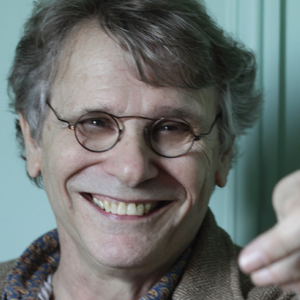Born Daniel Pennacchioni, Daniel Pennac was born in 1944 in Casablanca, Morocco. As a child, the various postings of his military father led him to live in Germany, Somalia, Ethiopia and Indochina. In a boarding school in France from years 8 to 13, he was bored silly and discovered early on the joy of books. His reading habit was compatible with the reputation as a dunce that remained attached to him during his entire school life. Reading, constantly and on the sly, was a way to ennoble oneself while breaking the rules, to open oneself to the world even as one’s ‘scholarly disgrace’ promises the torments of loneliness and shame.
In 1969, a masters of literature under his belt, Pennac began a 25 years career spent enthusiastically teaching students with educational difficulties. In 1973 he published Le Service Militaire au service de qui? (Le Seuil). In it, he explored three myths held by proponents of mandatory conscription: equality, maturity and virility while in uniform. It was followed by two politico-comical novels written with Romanian dissident Tudor Eliad: Les Enfants de Yalta (Jean Claude Lattès, 1976) and Père Noël (Grasset et Fasquelle, 1978). Then came a two years stay in Brazil, during which the writer found inspiration and material for a novel he would only write 23 years later: Le Dictateur et le Hamac (Gallimard, 2003).
Between 1985 and 1999, Daniel Pennac created the famous saga of the Malaussène family, published by Gallimard: Au Bonheur des Ogres (The Scapegoat), 1985; La Fée Carabine (The Fairy Gunmother), 1987; La Petite Marchande de Prose (Write to Kill), 1990 (‘Prix du Livre Inter’ award 1990); Monsieur Malaussène, 1995; Des Chrétiens et des Maures, 1997; Aux Fruits de la Passion (Passion Fruit), 1999. All powerfully contemporary, these novels are as serious as their narration is exhilaratingly funny; which is why they’ve fascinated a readership of remarkable diversity – be it cultural, sociological or generational.
But it was with Comme un Roman (Gallimard, 1992; translated as Reads Like a Novel and Better Than Life) that Pennac acquired international fame. In this gleefully corrosive essay, he denounced the disgust that the ‘forensic’ approach to teaching literature instils in so many students. He reawakened the desire to read, proclaimed ‘the reader’s indissoluble rights’ and rehabilitated reading out loud.
In 1997 was published Messieurs les Enfants (Gallimard), a family fable in which a group of children are turned into adults while their parents become children again. The novel was adapted for the big screen by Pierre Boutron.
In 2004 and 2007, company Hoëbeke published two photo albums, Les Grandes Vacances and La Vie de Famille, products of the complicity between Daniel Pennac and photographer Robert Doisneau. In 2006 came from the same publisher Nemo par Pennac, story of the encounter between the author and the subtle and mysterious Paris graffiti artist. In 2007 followed Ecrire, a collection of drawings from Pennac himself, in which he sketched the mental agonies of an author at work.
In 2005, Jean-Michel Ribes convinced Daniel Pennac to perform Merci (Gallimard, 2004) at the Rond-Point theatre. The show, hilarious soliloquy of a creator ‘honoured to be honoured’ for ‘his lifetime works’, would run for two years. For the next two years, still on the theatre stage, Pennac put in practice his rehabilitation of reading out loud with Bartleby, the Scrivener, unusual and moving chef-d’oeuvre by Herman Melville (Gallimard, 2003, translated by Pierre Leyris).
In Chagrin d’Ecole (Gallimard, prix Renaudot 2007), Pennac studied the ravages fear causes as much among students with educational difficulties as among their parents or teachers, and suggested ways to remedy that major cause of failure at school.
In 2012, Lilo Baur put on Le 6e Continent (Gallimard, 2012), an environmental tale written by Pennac from a collective improvisation by the director’s troop. The same year came out Journal d’un Corps (Gallimard), in which Pennac followed the evolution of his narrator’s body from age 13 to 87. It was adapted into a long tour of theatrical readings produced by Clara Bauer.
Pennac’s first books were for children – Cabot-Caboche and L’Oeil du Loup (Nathan, 1982, 1984) – and he never stopped writing for them, as evidenced by the Kamo series (Gallimard Jeunesse, 1997-2007) and, more recently, Le Roman d’Ernest et Célestine (Casterman, 2012), adapted for cinema by Benjamin Renner. The author wrote that story, and the accompanying script, as a homage to his friend Monique Martin, a.k.a. Gabrielle Vincent (1928-2000), creator of the Ernest et Célestine stories published by Casterman.
On 28 March 2013, the university of Bologna, oldest in Europe, made Daniel Pennac an honorary doctor in pedagogy. He gave his inaugural doctoral lecture in Italian: ‘Una lezione d’ignoranza’ – a lesson in ignorance.
Aside from novels, Pennac also wrote for bande dessinée. La Débauche, with Jacques Tardi (Gallimard Futuropolis, 2000), denounced the flood of abusive layoffs that started plaguing our businesses with the beginnings of globalisation. It was followed by two Lucky Luke stories for Lucky Comics, Lucky Luke contre Pinkerton (Lucky Luke versus the Pinkertons), 2010, and Cavalier Seul (Lone Riders), 2012, written in collaboration with novelist Tonino Benacquista and drawn by Achdé. After he met Florence Cestac in 2014, they created Un Amour Exemplaire (Dargaud, 2015) together, a wonderful love story.

